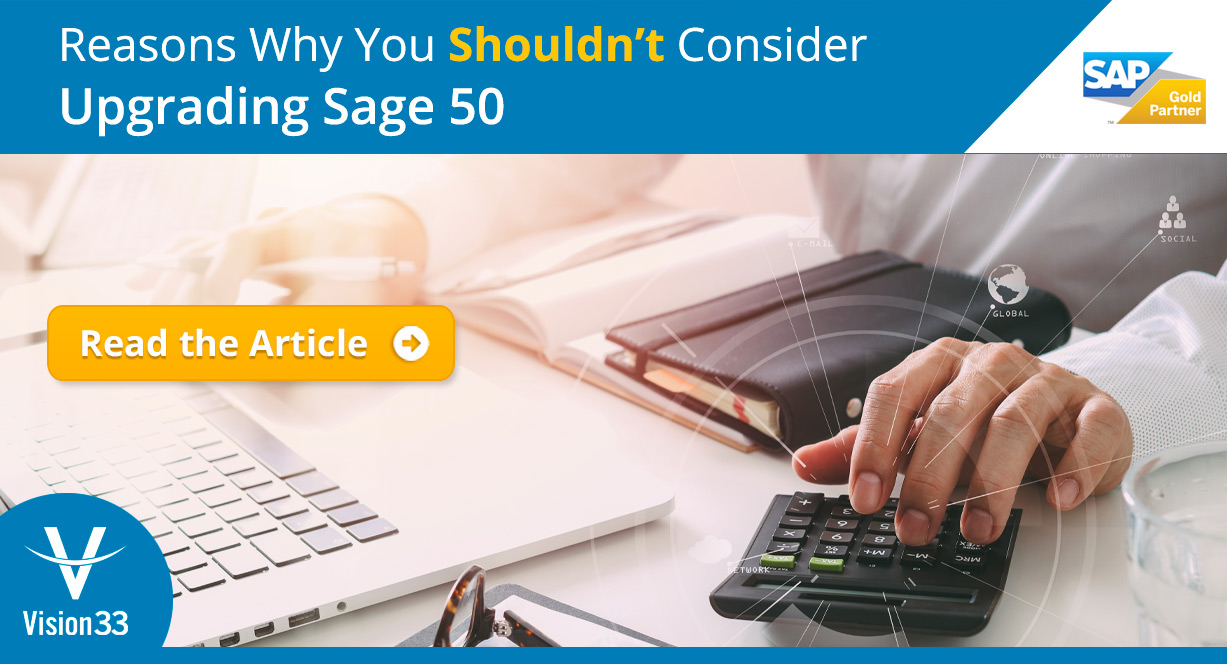Why Your Growing Business Should Graduate from Sage 50 to Sage Intacct
Sage IntacctTo continue growing, it's time to automate business processes with a cloud-based accounting...

May 09, 2019
Blog > Reasons Why You Shouldn’t Consider Upgrading Sage 50
Running a successful business is about making good decisions - whether it’s selecting the right products to stock, choosing services to offer, or expanding your operations into new markets. If you’re considering upgrading your Sage 50 system, chances are you’ve made sound decisions that led your business to its current stage of growth. But it’s important to recognize when maintaining the status quo no longer serves your business and its potential. If you’re considering upgrading Sage 50 to the next software tier in the Sage product line, here are a few reasons why this may not be the best decision for your business as it continues to grow.
Investing in a simple accounting program like Sage 50 (or any of its other monikers including Sage Line 50, Sage 50 Accounting, and Sage 50Cloud Accounts) was the right choice when your business was smaller, but since then your business has grown more complex. You may think that moving to the next tier of Sage software will overcome growth challenges like providing support for more concurrent users, but this won’t address the complexity of your business.
You need features like CRM to manage your customers better, functionality to support new departments, and accurate real-time reporting to empower your decision making. Upgrading Sage 50 licensing to a higher user capacity is a temporary fix - you’re not addressing the need for additional business functions that the next tier of Sage accounting software doesn’t possess. All the while your business growth’ is tracking to outgrow the limitations of the next tier with each new capacity and upgrade adding costs and future disruptions to your business.
Consider the long-term for an important investment like a new business management solution. On the Sage upgrade path, you will further delay access to a solution with a high level of customization or vertical market specialization. Additionally, you can expect frequent downtime as you continually outgrow your current program and have to migrate to the next version time and time again. Not only does this incremental upgrade path result in frequent data migrations, but it can also be very costly for your business.
While maintaining the status quo or extending the capacity of your current solution through Sage program upgrades may help to maintain your business’ performance in the short-term, it won’t address the real issue: the need for scalability and additional functions to enable your business to thrive. If you choose to stay on the Sage upgrade path, your business growth will inevitably put too much pressure on a system that wasn’t designed to ride with you to the next stage of growth.
Address the real issue facing your business and move to an enterprise resource planning (ERP) software solution like SAP Business One. Vision33 can help. We have developed a guide titled From Sage 50 to SAP Business One: Choosing the Right Path for Business Growth. Read this guide to ensure you make an informed decision for your next business management solution.
Subscribe to our newsletter to receive our latest blog posts, case studies and ERP news delivered straight to your inbox.
To continue growing, it's time to automate business processes with a cloud-based accounting...
SAP Business One reigns supreme as the go-to ERP for SMBs. Learn about key updates and the benefits...
iDocuments Purchase-to-Pay is an innovative software that helps businesses take control of...
Recieve our latest blog posts, case studies, and ERP news
delivered straight to your inbox.